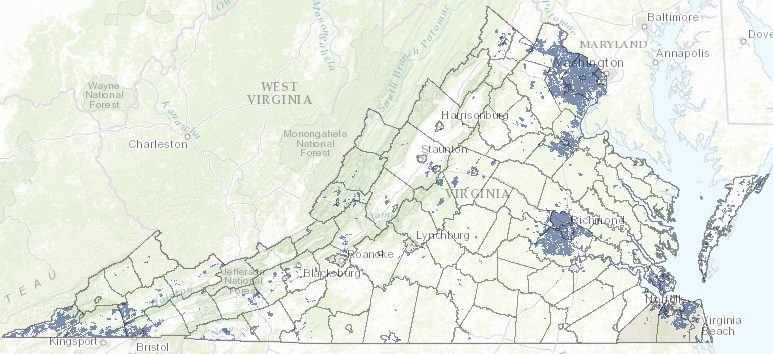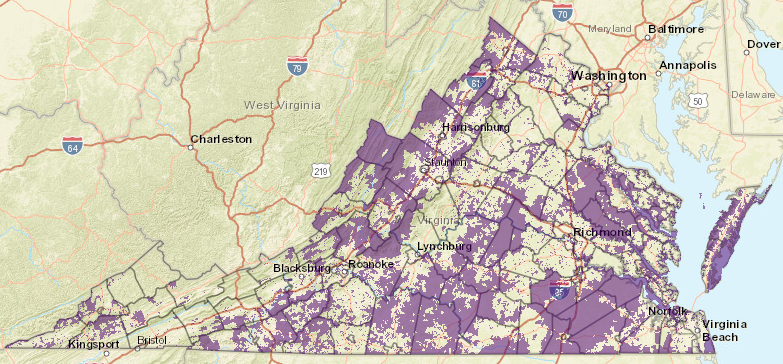How Will the Internet Change Virginia's Regions?

in 2016 the urban centers of Northern Virginia, Richmond, and Hampton Roads had high-speed broadband service provided by fiber optics - and so did a portion of Southwest Virginia in Lee, Scott, Russell, and Washington counties
Source: Virginia Office of Telework Promotion and Broadband Assistance, Coverage Maps
Where is "there" on the Internet? A fast telecommunications link without much competing traffic could make Ewing (in Lee County) more accessible than Crystal City (next to the Pentagon).
The Internet dramatically reduces the importance of physical geography. Blackstone, Virginia is a great place to locate a distribution center for Wal-Mart and Ingram Books. Land is cheap for building a warehouse, and highways are nearby for trucking items all over the East Coast.
Ewing, on the other hand, has US Route 58, still being upgraded into a 4-lane highway across Virginia's southern border. That highway stretches from Cumberland Gap to the Atlantic Ocean, but intersects few population centers in-between.
The first highway in the far western edge of US Route 58 was called the "Wilderness Road" for a reason, and today the interstates are far away from Cumberland Gap. The Virginia and Tennessee Railroad connected the region to Tidewater Virginia in the 1850's. That spurred a shift from subsistence agriculture to a cash-crop economy, based on tobacco raised by slaves.
Transportation improvements have been concentrated on the eastern edge of the Valley and Ridge portion of Southwest Virginia. Even today, regional politicians focus on expanding I-81 and increasing passenger rail connections through Bristol.
The Lenowisco Planning District (composed of Lee County, City of Norton, WiseCounty, and Scott County) is too far away from any concentrated consumer market to justify major transportation investments. Private-sector employers find the region to have few natural resources other than coal and timber, a small population with a relatively unskilled workforce, and high costs for transporting raw materials and manufactured goods to and from the region.
Along the Kentucky border are the Virginia counties with coal mining jobs displaced by automation, the home of persistent poverty over the last 40 years. The investments of the Appalachian Regional Commission since the mid-1960's have not created a strong enough regional economy that can provide steady jobs to adults or new jobs for the teenagers graduating from local high schools each year.
However, the American economy is no longer driven by agriculture or manufacturing. The current economy is based on services, and the fastest growing sector is in services provided via the Internet. If Southwest Virginia could develop jobs in that sector of the economy, it could overcome its geographical limitations.
The last Democrat to represent the region, Rep. Rick Boucher, was co-chair of the Internet Caucus in the House of Representatives. He saw the potential for Southwest Virginia to create local jobs by providing services through modern telecommunications. When he was defeated, his Republican successor Rep. Morgan Griffith focused on retaining jobs in the coal industry.
High-speed internet access would theoretically make it possible for rural counties losing population to reverse the trend, with workers in low-cost communities performing jobs now done by residents in Northern Virginia. In 2019, Microsoft and a nonprofit broadband provider partnered to propose building a high-tech co-working space and offices in South Boston. It was the first new building for the town in the last four decades.1

locations in Virginia with no residential broadband service in 2017
Source: Center for Innovative Technology, Virginia Broadband Availability Map and
Integrated Broadband Planning and Analysis Toolbox
Links
- The Wired Road (Grayson County, Carroll County, City of Galax, and Blue Ridge Crossroads Economic Development Authority)
References
1. "Microsoft to open community center - Microsoft to open technology-focused community center in South Boston," The Roanoke Times, April 30, 2019, https://www.roanoke.com/business/microsoft-to-open-technology-focused-community-center-in-south-boston/article_a382599d-dbaa-575e-a5a1-ecf22e12b70d.html (last checked May 1, 2019)
Regions of Virginia - and Why Isn't There An East Virginia?
Virginia Places

